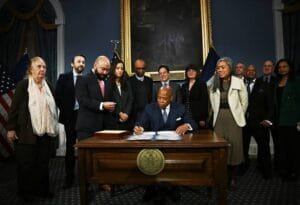New York State agencies, authorities launch car free for Climate Campaign

New York State agencies and authorities today launched the “Car Free for Climate” campaign as part of the State’s recognition of Climate Week 2020 between Sept. 21 and 27.
According to an official, the campaign is aimed at reducing climate-altering greenhouse gas emissions by encouraging New Yorkers to pledge to forego driving their vehicles at least one day during Climate Week and instead walking, riding a bike, or using mass transit.
Car Free for Climate supports New York’s ambitious goals to reduce greenhouse gas emissions 40 percent by 2030, and 85 percent by 2050, from 1990 levels.
State agencies and authorities leading the Car Free for Climate campaign and outreach efforts include the State Department of Transportation and the co-chairs of the GreenNY Council: the State Department of Environmental Conservation; New York State Energy Research and Development Authority; Office of General Services; and the New York Power Authority.
To participate, New Yorkers are urged to click here to take the pledge to not drive their car at least one day during the week of Sept. 21 to 27, and then follow through with that commitment to be car free.
Participants are also encouraged to let friends and neighbors know about going Car Free for Climate by posting about their experience on social media using the hashtag #NYSCarFree.
Governor Andrew M. Cuomo launched the GreenNY Council to serve as a key resource to support New York State’s strategy for reducing agency and authority greenhouse gas emissions.
The co-chairs have been working together for more than a year to leverage resources, create guidance, and make it easier for agencies to meet the State’s ambitious climate and sustainability goals.
To support the effort and encourage New Yorkers to take the Car Free for Climate pledge, State agencies and authorities are conducting public outreach with a new PSA, poster, and social media in the run up to Climate Week 2020.

DEC Commissioner and Climate Action Council Co-chair, Basil Seggos said, “Transportation is the largest source of New York’s greenhouse gas emissions. We need an all hands-on deck approach to reducing emissions and we are encouraging all New Yorkers to join us in this effort.
“New York can and should be an example for the rest of the nation to follow and taking the Car Free for Climate pledge is a great way to start.”
Doreen M. Harris, Acting President and CEO, NYSERDA, and Climate Action Council Co-chair said, “Governor Cuomo’s clean energy and climate plan has made clear that combatting the effects of a changing climate requires a deliberate commitment, with each of us exploring new options for how we can shrink our carbon footprint while continuing with our daily activities and maintaining our schedules.
“The Car Free for Climate pledge is an excellent opportunity for all New Yorkers to do just that – bike to work, bundle errands, or recreate locally – and learn more about how small changes incorporated into each day can deliver meaningful benefits for our natural resources and communities while helping our fight against climate change.”
OGS Commissioner RoAnn Destito said, “Considering ways to make every project we do at OGS cleaner, greener and more energy-efficient is an important part of our planning process.
“The Car Free for Climate campaign is a great way to increase awareness about greenhouse gas emissions and offers easy ways for all New Yorkers to help reduce them.”
State Department of Transportation Commissioner Marie Therese Dominguez said, “The New York State Department of Transportation continues to enhance the Empire State’s transportation network to reflect the true diversity of how New Yorkers travel — pedestrians, bicyclists, transit riders and drivers alike.
“DOT is proud to support the GreenNY Council along with our colleagues at other state agencies as we educate, advocate and invest in cleaner transportation alternatives.
“During this week-long campaign, I urge New Yorkers to get out of their vehicles and take advantage of the variety of transportation alternatives available to them so we can all do our part to combat climate change and reduce greenhouse gas emissions.”
According to Gil C. Quiniones, President and CEO, New York Power Authority, the New York Power Authority is actively working on infrastructure to support electric vehicle driving in New York State so that we can reduce the number of gas vehicles on the road.
“Of course, not driving a gas car is the number one way to not add carbon to the atmosphere.
“That’s why we encourage all New Yorkers to take part in ‘Car-Free for Climate’ week and leave their cars in the garage for just one day during the Sept. 21-27 week,” Quiniones said.
He added that together we can reduce pollutants into the atmosphere and begin to build “a cleaner environment for our children and theirs.”
There are many ways New Yorkers can go Car Free for Climate, such as reducing trips by combining errands into a single day, using public transit, walking to the neighborhood pizza place, or enjoying parks and open space within walking or biking distance.
Transportation accounts for 36 percent of greenhouse gases in New York State and represents more than electricity generation, waste, refrigerants, and agriculture combined.
To encourage New Yorkers to go Car Free for Climate all year round, the State has invested in non-vehicle transportation, including biking/walking infrastructure and the Empire State Trail from Albany to Buffalo and New York City to the Canadian Border.
In addition, through the Downtown Revitalization Initiative, New York State has supported transforming downtown areas to make it easier for people to walk or bike.
New York State has also invested in pedestrian safety through the New York State Pedestrian Safety Action Plan, a five-year, $110 million multi-agency initiative launched in 2016 to make streets safer for pedestrians.
Other initiatives and programs designed to achieve Governor Cuomo’s Charge NY goal of 10,000 EV charging stations by the end of 2021 and 850,000 zero emission vehicles by 2025 are also already underway.
Under NYSERDA’s Drive Clean Rebate program, more than $35 million in rebates have now resulted in over 25,000 electric vehicle purchases as of June of this year.
In 2019, Governor Cuomo signed the Climate Leadership and Community Protection Act (CLCPA), the most ambitious climate and clean energy legislation in the country.
The CLCPA requires the State to achieve a zero-emission electricity system by 2040 and reduce greenhouse gas emissions 40 percent below 1990 levels by 2030 and 85 percent by 2050, setting a new standard for states and the nation to expedite the transition to a clean energy economy.
The law drives investment in clean energy solutions such as wind, solar, energy efficiency and energy storage and ensures that at least 35 percent of the benefits from clean energy investments are realized by disadvantaged and low-to-moderate income communities.
The CLCPA calls for an equitable and just transition to clean energy that creates jobs and continues fostering a green economy as New York State Builds Back Better as it recovers from the COVID-19 pandemic.
Enshrined into law through the CLCPA, New York is on a path to reach its goals of economy wide carbon neutrality and achieving a zero-emissions electricity sector by 2040, faster than any other state.
It builds on New York’s unprecedented ramp-up of clean energy including a $3.9 billion investment in 67 large-scale renewable projects across the state since 2017; sustained progress through the recent launch of the largest combined solicitations for renewable energy ever issued in the U.S. seeking up to 2,500 additional megawatts of offshore wind and over 1,500 megawatts of land-based renewable energy; the creation of more than 150,000 jobs in New York’s clean energy sector; a commitment to develop over 1,800 megawatts of offshore wind by 2024; 1,800 percent growth in the distributed solar sector since 2011; efforts to expand and update the Regional Greenhouse Gas Initiative, increase funding and access to clean energy for low- and moderate-income families; a commitment to electrify buses and trucks; and accelerate the adoption of electric vehicles, including $206 million of $701 million allocated for building electric vehicle charging stations and infrastructure in disadvantaged communities announced by the Governor just last month.











